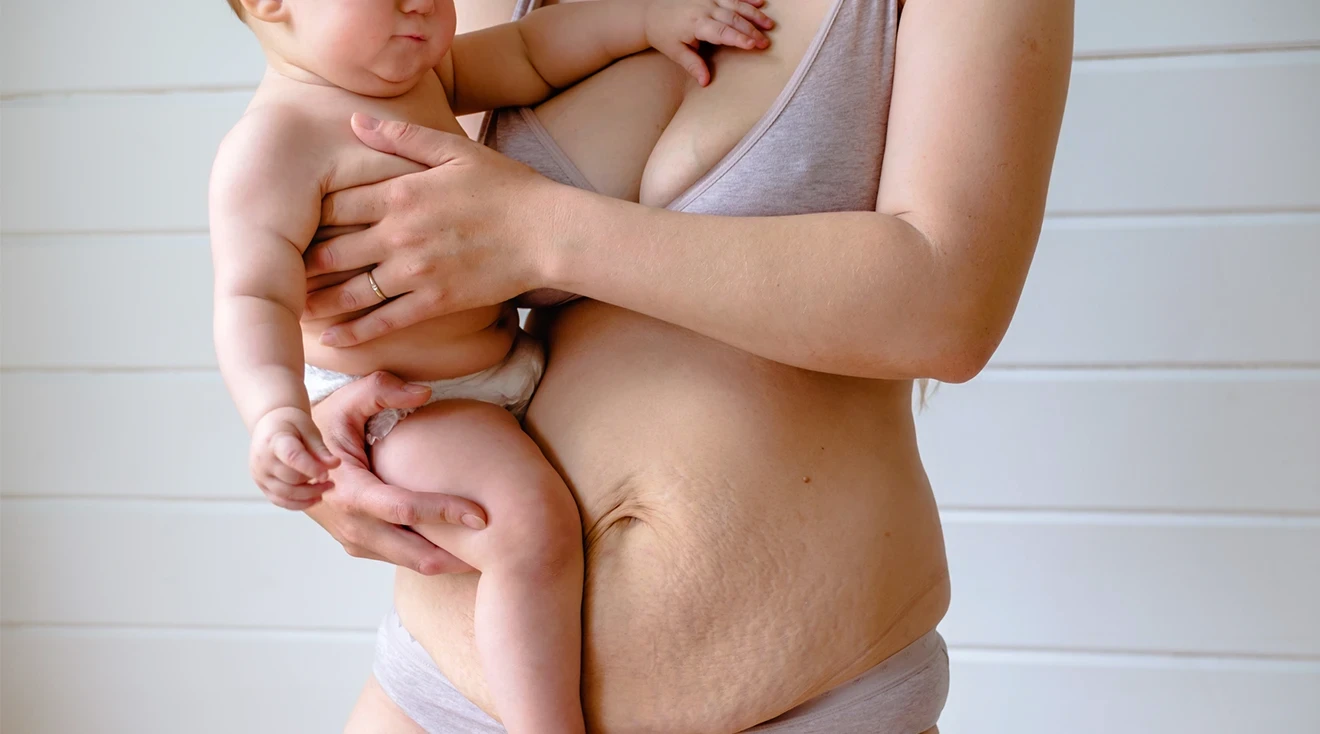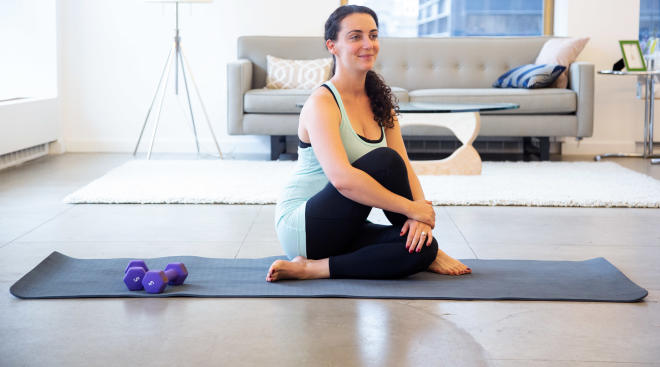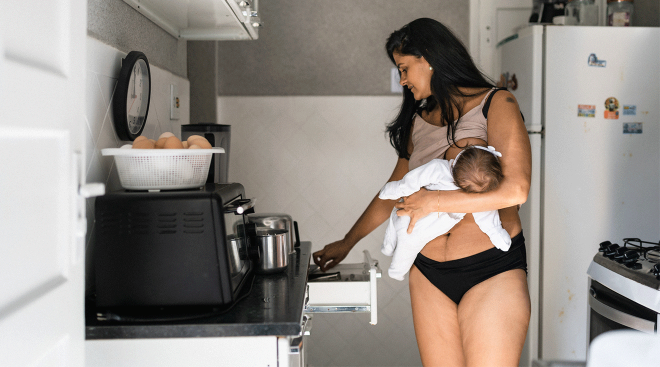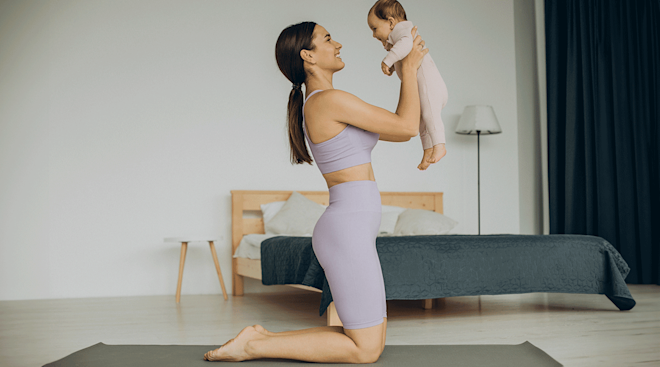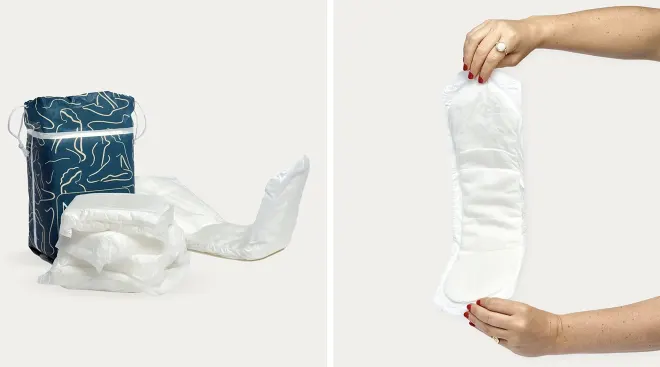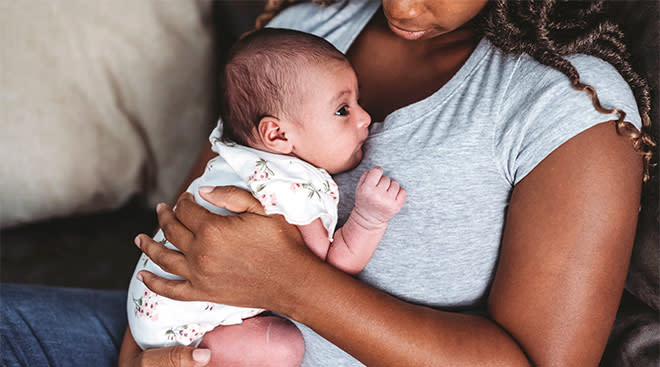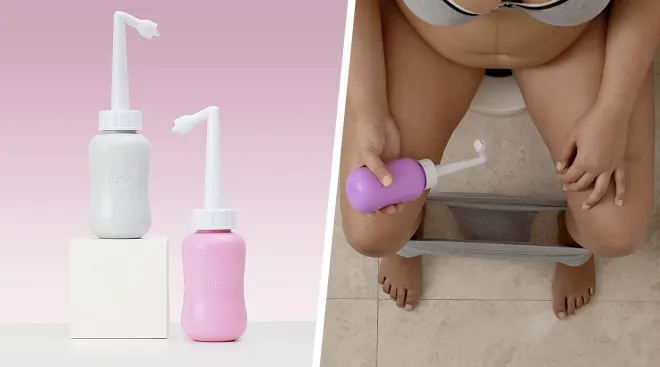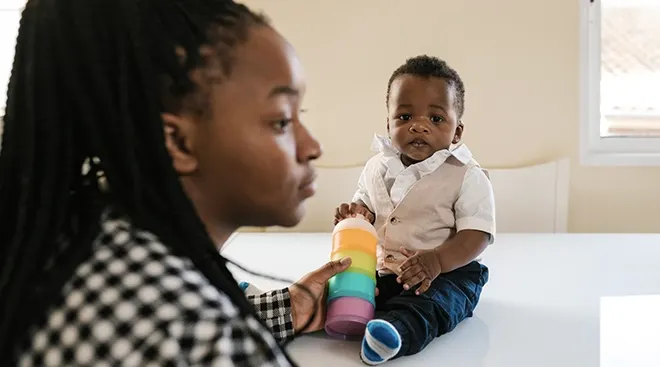How to Love Your Postpartum Body
You carried baby for over nine months—nine+ long months of reading about baby’s week-by-week development, stocking up on newborn essentials and learning how to care for an infant. And then it happened: Your water broke, baby came and life as you knew it changed forever. Of course, by then you were prepped and ready for all the changes baby was about to go through. But how prepared were you for the toll it would all take on your body? While pregnancy is a miraculous time, it can change your body in many ways. If you’re feeling uncomfortable in your skin following baby’s birth, know you’re definitely not alone. While it’ll take some time to adjust, you can learn to love your postpartum body—and there are so many reasons why you should.
Feeling uneasy in your postpartum body? This moment of uncertainty affects almost all new mamas (even those who seemingly have an easier time with postpartum recovery). After all, there’s a laundry list of physical transformations women experience during pregnancy and postpartum, says Sherry Ross, MD, an ob-gyn, women’s sexual health expert and co-founder of Oneself Intimate Skin Care. “Through a bombardment of hormonal changes, the body prepares, carries and grows a full-term baby over a nine-month period of time,” Ross says. “During this transformational time, our miraculous bodies go through the necessary physical changes, for better or for worse, to prioritize the growth and development of a small human being.” But some of these can stick around for a few weeks or even months (or years!) after baby’s birth. Read on to learn more about what to expect from your post-pregnancy body.
Differences down there
Regardless of whether baby was born vaginally or via c-section, you can expect some postpartum body changes to your vaginal and pelvic muscles.
- Lochia: This is your postpartum body shedding all the blood, mucus, cells and other fluids from the lining of your uterus. Many women experience this heavy vaginal bleeding for up to 6 weeks after birth.
- Soreness and swelling: You might also be a little swollen and sore overall, depending on your birth experience, whether you experienced any tearing and if you had an episiotomy—and don’t be surprised if you experience itchiness down there as everything heals.
- Postpartum hemorrhoids: These can affect up to 40 percent of pregnancies and can also cause uncomfortable itching. Luckily, they should go away a few weeks following childbirth.
- Urinary incontinence: You may find you pee a little when you sneeze, laugh or exercise. This is called stress urinary incontinence, per the American College of Obstetricians and Gynecologists (ACOG). It’s a result of weakened pelvic floor muscles following childbirth. (Luckily, pelvic floor therapy can help you strengthen those muscles.)
Postpartum bump and pooch
According to the American Pregnancy Association (APA), it takes around 6 weeks after birth for your uterus to shrink back down from approximately 2.5 pounds to 2 ounces. You’ll likely have a bit of a bump, as well as some bloating during this time. (Though if you breastfeed, it can cause uterine contractions—called afterpains—that cause the uterus to shrink a little quicker.) Even after your bump is gone, your postpartum belly may have looser and squishier skin.
Some women may also experience diastasis recti, which is a separation of the abdominal muscles after birth. You may have a soft, jello-like area right between your muscles or a “pooch” around your belly button.
I lost all of the baby weight really fast, but I carry my weight differently now. I lost most of the weight in my legs, which are thinner than before I became pregnant and totally unexpected, but now I hold weight in my belly—totally worth it though.
Stretch marks
According to a 2015 study, postpartum stretch marks affect up to 90 percent of pregnancies. Safe to say, your belly isn’t the only place where you may see stretch marks postpartum—they may also appear on your butt, thighs or breasts, per ACOG.
Skin discoloration
Some women may also find their linea nigra—that dark line running down their belly—continues to hang around after baby’s born. Not to mention, many women also deal with melasma—which causes darker, blotchy spots on the face and body—during pregnancy. While melasma will usually go away on its own after baby’s birth, for some it can last for years, notes the American Academy of Dermatology Association.
Scarring
Acne
Postpartum acne is usually a result of—you guessed it—fluctuating hormones after childbirth. Per Cleveland Clinic, these changes cause your postpartum body to produce excess oil, clogging your pores and leading to breakouts. Luckily, this should also die down as your hormones stabilize.
Bigger breasts
A few days after delivery your breast milk will come in, causing your breasts to feel engorged (i.e. heavier, larger and more tender), the APA notes. You may also experience some nipple discharge, adds Ross.
I felt and looked a bit puffier all over for a while after birth. It took a minute for things to return to baseline. Of course, my puffy (exhausted) eyes remain even though I’m well past the postpartum stage—but that’s just the reality of #momlife.
Swelling in the legs, arms and face
Just like in pregnancy, you may still experience some swelling in your legs, arms and face, Ross says. The pregnancy hormones that caused the increased blood volume and fluid will take some time to normalize within your postpartum body. Plus, fluids from any IV drips can also cause swelling after birth.
Postpartum hair loss
Around three months after baby’s birth, you may notice your hair begins falling out. Though experts haven’t found a definitive cause for postpartum hair loss, they believe it’s likely related to the physiological stress of delivering baby—not to mention all the sleep deprivation that comes after. As frustrating as this is, rest assured it should taper off and your hair should start looking somewhat normal around baby’s first birthday.
I've had extremely thick curly hair all my life, so the postpartum hair loss was a huge hit to me. About four months after the twins were born, I got so frustrated that I gave up and shaved the side of my head, just to try a new hairstyle that didn't look so patchy. It's been 3 years now and I've kept that hairstyle to this day, and I actually get so many compliments on it—I don't see myself going back to a full head of hair anytime soon!
Excessive sweating
Once again, you can chalk up all that sweat—especially at night—to changing hormone levels and decreased estrogen and progesterone, per March of Dimes. Luckily, your body temperature should be back to normal within a few weeks after delivery (but may take longer if you’re breastfeeding).
Varicose veins
According to the APA, varicose veins during pregnancy are caused by the increase in blood volume and, consequently, pressure on the veins. While they’re commonly seen on the legs, you may also find them on your vulva, vagina and buttocks. Thankfully, these should go away three months to a year after childbirth.
Aches, pains and fatigue
Your body just delivered a baby, so some aches and pains, as well as fatigue is par for the course. According to ACOG, pain in your neck, back and joints is common and usually the result of hormonal changes, as well as all the strenuous pushing you did during delivery. Plus, dealing with all these postpartum bodily changes while taking care of baby and running on little sleep, can cause anyone to feel fatigued. To find some rest, try using a heating pad on any sore areas in your neck and back—and try to squeeze in some sleep whenever you can.
Mental health shifts
Childbirth doesn’t just take a toll on your physical health, it can also take a toll on your mental health. Suddenly you’re responsible for a tiny new human that relies on you for everything—it’s no wonder up to 21 percent of new moms experience postpartum anxiety. Plus, depending on your personal and family history, you may also be at an increased risk for postpartum depression—which up to 15 percent of women experience, per March of Dimes—as well as postpartum OCD. It’s important not to brush these feelings to the side—instead, open up to your support system and reach out to your provider for help.
Some good news? Though your body will undergo several changes during those nine+ months, some occur due to hormonal shifts and will normalize within the first few weeks or months after delivery. “It’s important to remember [this is] a temporary time in a person’s life,” Ross says. “Pregnancy can be one of the most joyous, magical and life-changing moments people go through. I tell my patients to enjoy the ride and give yourself a two-year pass to allow your body to work its magic and slowly find its way back to normalcy.” Of course, some changes may stick around for longer, but it’s important to acknowledge them for what they are: a reminder of the remarkable feat your body just pulled off. Below, some tips on how to love your postpartum body.
My biggest takeaway, three years postpartum, is that sometimes your postpartum body changes in ways that aren’t predictable or like everyone else. I haven’t really dealt with weight issues, stretch marks or hair loss. But I do have complicated back and pelvic floor issues from carrying a 10-pound baby. Right now, I’m really focusing on strengthening my core in order to heal everything. My advice is to realize that everything in the body is related—and that getting to the root of your symptoms may take a while (I’m still getting there), but it’s really worth it. — Natalie G., The Bump senior editor and mom of one
Stop comparing yourself to others
You’ve probably heard this one before, but it still bears repeating: If it took nine+ months to gain the baby weight, you can’t expect it to vanish overnight. According to Jennifer Wider, MD, a women’s health expert and author of The New Mom’s Survival Guide, women are often too hard on themselves, both before and after baby. “We’re always comparing ourselves to the images we see in the media, trying to live up to some unrealistic body type,” says Wider. “Women need to give themselves a break!”
As hard as it may be, stop comparing yourself to those who seem to return to their “pre-baby selves” quickly, whether that’s on social media or in real life. At the end of the day, everyone’s bodies and circumstances are different, and you never know what someone might be going through behind closed doors.
Unlearn unrealistic societal expectations
Similarly, recognize how improbable societal ideals are of pregnant women and postpartum bodies. “We’ve grown accustomed to seeing unattainable versions of pregnant women. Whether we realize it or not, we internalize a lot of these images into our own expectations of what a pregnant body should look like during gestation and what our body should look like postpartum,” says Josephine Atluri, a women’s health and mental health expert. “So often we see bodies that just ‘bounce back to normal’ without discussion of what it took to get there and how long.” When faced with all of these unrealistic expectations, it can be challenging to combat feelings of inadequacy. However, understanding that these images are often impractical—and reminding yourself of it—can help you feel more confident in your own skin.
Shift your perspective
We tend to get so bogged down in the details that it can be helpful to take a step back and look at the bigger picture. “Just like an athlete, you’ve trained your body for nine months and have performed this amazing feat that has left your body totally exhausted,” Wider says. “Pat yourself on the back for what you’ve just accomplished and give yourself time to heal.” Rather than thinking negatively of stretch marks, a c-section scar and other physical changes brought on by pregnancy, reframe your mindset to think about them as “badges of honor,” Atluri says. “[They’re] almost like tattoos, reminding you of the unbelievable miracle that your body went through to birth a child.” Take inspiration from Lori Richmond, a mom and The Bump app user, who tells her son that her c-section scar is “the door to his old house.” How sweet is that?
Be nice to yourself
As you work on reframing your thoughts, remember to be kind. Shifting one’s perspective takes time, so don’t get down on yourself for not being able to accept these body changes after pregnancy immediately. Instead, honor the feelings you’re having and offer yourself love and compassion as you work through them. “When you notice you’re being overly judgmental about yourself, hit the pause button on the negative chatter by asking yourself these three questions about the thought: Is it true? Is it kind? Is it necessary?,” advises Atluri. At the end of the day, remember that you’re often your own worst critic, so cut out any unproductive, negative self-talk.
Practice daily gratitude
We know you’ve heard this one before, but it works. One of the best ways to remind yourself of how incredible your postpartum body is? List everything about it that you’re grateful for. “Gratitude is a powerful mindfulness technique that can be used to shift a woman’s mindset post-baby from one of negativity to positivity,” Atluri says. She recommends writing a love letter to yourself, thanking your body for everything it’s accomplished and the ways in which it continues to care for baby, you and your family. Turn this into a daily habit by listing at least one thing your postpartum body did that day that you’re grateful for, Atluri says. Pretty soon, the negative self-talk will quiet down.
Find your support system
In times when it’s hard to be your own cheerleader, it can be helpful to surround yourself with people who remind you of how far you’ve come. Wider suggests joining new mom support groups for a chance to connect with others who may be in a similar boat. It’ll allow you to not only share your struggles, but also lend an ear to other mamas. “Hearing stories from other women who had similar issues will support and validate you,” says Wider.
Allow yourself time for self-care
While caring for baby is super important during the fourth trimester, you can’t forget to care for yourself too. Schedule in some “me” time at least once a week. Leave baby with your partner or a trusted loved one for an hour or two and do something that makes you feel good. Get a mani-pedi, go to a museum, grab some lunch with a friend or simply take that much-needed bubble bath. Allowing yourself time for small things that make you feel good will help you be more comfortable in both your new skin and in your new role.
Communicate with your partner
Intimacy might not be the first thing on your mind during those first few weeks or months with baby. After midnight feedings, messy diaper changes and answering baby’s every cry, you’re bound to feel wiped. Add on the amount of recovery time you’ll need after birth (usually six to eight weeks), and sex may not be high on your priorities. Still, it’s important to communicate any uncertainty you have around your postpartum body to your partner. It may be uncomfortable, but they’re on this journey with you, and talking out your feelings with them might help you move past some of the insecurities. “Your partner will certainly support you,” says Wider. “But sometimes you’ll have to spell out exactly what you need: love, acceptance and support.”
Please note: The Bump and the materials and information it contains are not intended to, and do not constitute, medical or other health advice or diagnosis and should not be used as such. You should always consult with a qualified physician or health professional about your specific circumstances.
Plus, more from The Bump:
Josephine Alturi is an expert in meditation and mindfulness, as well as a fertility and parenting coach. She’s a mom to seven and created her family through in-vitro fertilization, international adoption and surrogacy. She uses this personal experience to inform her work. A graduate of the University of Chicago, Alturi is also the host of the podcast “Responding to Life: Talking Health, Fertility, & Parenthood,” as well as the author of [Mindfulness Journal for Parents and [5 Minute Mindfulness for Pregnancy.
Sherry Ross, MD, is an ob-gyn and women’s sexual health expert. She’s the author of She-ology: The Definitive Guide to Women’s Intimate Health. Period. and She-ology, The She-quel: Let’s Continue the Conversation. She’s also the co-founder of Oneself Intimate Skin Care and the Women's Health & Wellness School on the Mproov app. She earned her medical degree from New York Medical College and completed her residency at University of Southern California School Of Medicine.
Jennifer Wider, MD, is a women’s health expert and author of [The New Mom’s Survival Guide. She received her medical degree from the Mount Sinai School of Medicine in New York City.
Frontiers in Surgery, Perianal Diseases in Pregnancy and After Childbirth: Frequency, Risk Factors, Impact on Women's Quality of Life and Treatment Methods, February 2022
American College of Obstetricians and Gynecologists, Urinary Incontinence, July 2022
American Pregnancy Association, Postpartum Recovery
British Journal of Dermatology, Stretch marks during pregnancy: a review of topical prevention, March 2015
American College of Obstetricians and Gynecologists, Skin Conditions During Pregnancy, July 2022
American Academy of Dermatology Association, Melasma: Overview, February 2022
Cleveland Clinic, Postpartum Acne, November 2022
March of Dimes, Your Body After Baby: The First 6 Weeks, September 2023
American Pregnancy Association, Treat Varicose Veins Naturally During Pregnancy
American College of Obstetricians and Gynecologists, Postpartum Pain Management, August 2022
The Journal for Nurse Practitioners, Postpartum Anxiety, January 2021
March of Dimes, Postpartum Depression, March 2019
Learn how we ensure the accuracy of our content through our editorial and medical review process.
Navigate forward to interact with the calendar and select a date. Press the question mark key to get the keyboard shortcuts for changing dates.

































